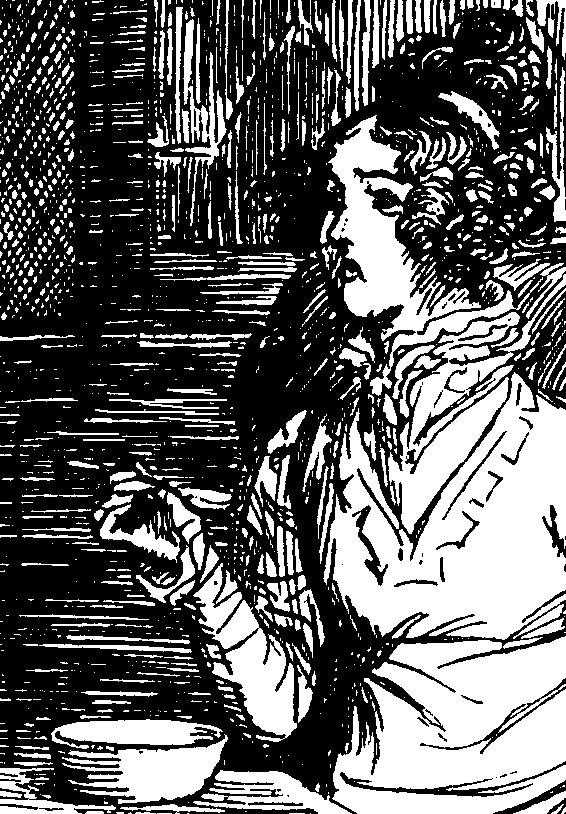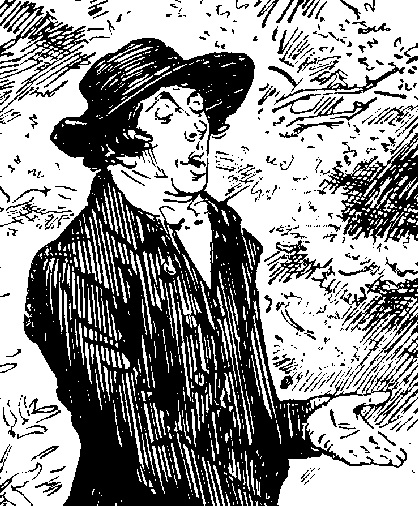| Of course, an obsessive interest in health can have its
comic side, and Jane Austen's wit and fun seize on this with great glee:
who can forget here the Parker family with their nerves and headaches and
fainting fits, their salts and drops and phials of medicine? Or the wonderful
valetudinarian Mr Woodhouse, with his 'benevolent nerves', his anxiety
about everyone's health, his deep interest in how food should be prepared:
"an egg boiled very soft is not unwholesome"?
This gifted writer who loved good health, whose heroines enjoy their
country walks, whose books have many references to good food (roast mutton
and rice pudding for nursery dinner: delicate arrowroot for an ailing young
lady), also took pleasure in her own ability to earn money by her books.
Delightedly she writes in a private letter that one of her novels is now
in a second edition, and she 'cannot help hoping that many will
feel themselves obliged to buy it".
We are told by another writer, the American Ayn
Rand, that wealth is the product of man's capacity to think. As you
conclude what I hope will be a very successful Forum on Wealth Generation
in the Healthcare and Pharmaceutical Sectors, may I also hope that you
will find it stimulating to visit the home of, and to reflect upon the
life and work of, a very clever, very kindly, very perceptive and creative
writer whose books are much concerned with the perennially interesting
topics of Health and Wealth. |
'..Since Tuesday evening,
when her complaint returned, there was a visible change, she slept more
& much more comfortably, indeed during the last eight & forty hours
she was more asleep than awake. Her looks altered & she fell away,
but I perceived no material diminution of strength & tho' I was then
hopeless of a recovery I had no suspicion how rapidly my loss was approaching
..... She felt herself to be dying about half an hour before she became
tranquil & apparently unconscious. During that half hour was her struggle,
poor soul! she said she could not tell us what she suffered, tho' she complained
of little fixed pain. When I asked her if there was any thing she wanted,
her answer was she wanted nothing but death & some of her words were
"God grant me patience, Pray for me oh Pray for me". Her voice was affected
but as long as she spoke she was intelligible ... Mr Lyford had been sent
for, had applied something to give her ease & she was in a state of
quiet insensibility by seven o'clock at the latest. From that time till
half past four, when she ceased to breathe, she scarcely moved a limb,
so that we have every reason to think, with gratitude to the Almighty,
that her sufferings were over. A slight motion of the head with every breath
remained till almost the last. I sat close to her with a pillow in my lap
to assist in supporting her head, which was almost off the bed, for six
hours...I was able to close her eyes myself & it was a great gratification
to me to render her these last services. There was nothing convulsed or
which gave the idea of pain in her look, on the contrary, but for the continual
motion of the head, she gave me the idea of a beautiful statue, & even
now in her coffin, there is such a sweet serene air over the countenance
as is quite pleasant to contemplate. This day my dearest Fanny you have
had the melancholy intelligence & I know you suffer severely, but I
likewise know that you will apply to the fountain-head for consolation
& that our merciful God is never deaf to such prayers as you will offer.
The last sad ceremony is
to take place on Thursday morning, her dear remains are to be deposited
in the cathedral - it is a satisfaction to me to think that they are to
lie in a Building she admired so much - her precious soul I presume to
hope reposes in a far superior Mansion. May mine one day be reunited to
it.
Cassandra Austen to Fanny Knight on 20 July 1817 |


